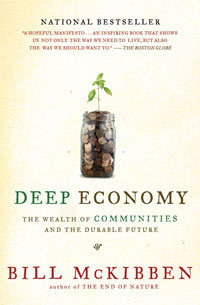File:Deepeconomypb-mckibben.jpg
Deepeconomypb-mckibben.jpg (200 × 305 pixels, file size: 16 KB, MIME type: image/jpeg)
Bill McKibben -- Planet Citizen
http://www.greenpolicy360.net/w/Bill_McKibben,_planet_citizen
http://www.greenpolicy360.net/w/350.org
http://www.greenpolicy360.net/w/PlanetCitizen
○ ○ ○ ○ ○ ○ ○ ○ ○ ○ ○ ○ ○ ○ ○ ○ ○ ○ ○ ○ ○
Deep Economy: The Wealth of Communities and the Durable Future
http://www.billmckibben.com/deep-economy.html
"Masterfully crafted, deeply thoughtful and mind-expanding." ― Los Angeles Times
In this powerful and provocative manifesto, Bill McKibben offers the biggest challenge in a generation to the prevailing view of our economy. Deep Economy makes the compelling case for moving beyond "growth" as the paramount economic ideal and pursuing prosperity in a more local direction, with regions producing more of their own food, generating more of their own energy, and even creating more of their own culture and entertainment. Our purchases need not be at odds with the things we truly value, McKibben argues, and the more we nurture the essential humanity of our economy, the more we will recapture our own.
○ ○ ○ ○ ○ ○ ○ ○ ○ ○
From Publishers Weekly
Challenging the prevailing wisdom that the goal of economies should be unlimited growth, McKibben ("The End of Nature") argues that the world doesn't have enough natural resources to sustain endless economic expansion. For example, if the Chinese owned cars in the same numbers as Americans, there would be 1.1 billion more vehicles on the road—untenable in a world that is rapidly running out of oil and clean air. Drawing the phrase "deep economy" from the expression "deep ecology," a term environmentalists use to signify new ways of thinking about the environment, he suggests we need to explore new economic ideas. Rather then promoting accelerated cycles of economic expansion—a mindset that has brought the world to the brink of environmental disaster—we should concentrate on creating localized economies: community-scale power systems instead of huge centralized power plants; cohousing communities instead of sprawling suburbs. He gives examples of promising ventures of this type, such as a community-supported farm in Vermont and a community biosphere reserve, or large national park–like area, in Himalayan India, but some of the ideas—local currencies as supplements to national money, for example—seem overly optimistic. Nevertheless, McKibben's proposals for new, less growth-centered ways of thinking about economics are intriguing, and offer hope that change is possible.
○ ○ ○ ○ ○ ○ ○ ○ ○ ○
File history
Click on a date/time to view the file as it appeared at that time.
| Date/Time | Thumbnail | Dimensions | User | Comment | |
|---|---|---|---|---|---|
| current | 13:33, 25 May 2016 |  | 200 × 305 (16 KB) | Siterunner (talk | contribs) |
You cannot overwrite this file.
File usage
The following 2 pages use this file:
- Biosphere
- Citizen Science
- Climate Change
- EOS eco Operating System
- Earth360
- EarthPOV
- Earth Observations
- Earth Science
- Eco-nomics
- Ecological Economics
- Economics
- Energy
- Environmental Protection
- Environmental Security
- Global Security
- Global Warming
- Green Best Practices
- Green Graphics
- Green Networking
- Green Politics
- Networking
- Planet Citizen
- Planet Scientist
- Planet Citizens, Planet Scientists
- Renewable Energy
- Resilience
- Sea-Level Rise & Mitigation
- Solar Energy
- Sustainability
- Sustainability Policies
- ThinBlueLayer
- Whole Earth
